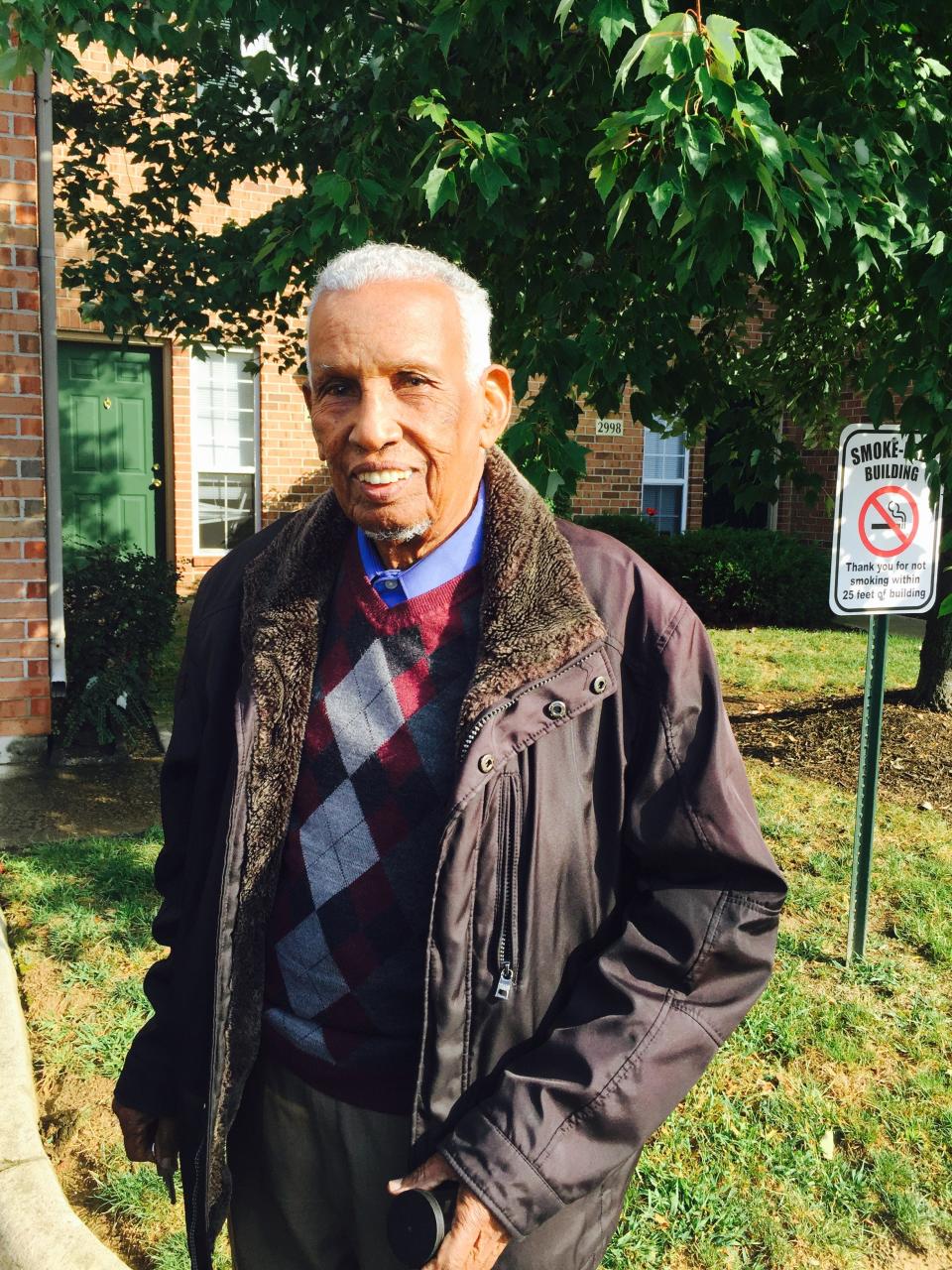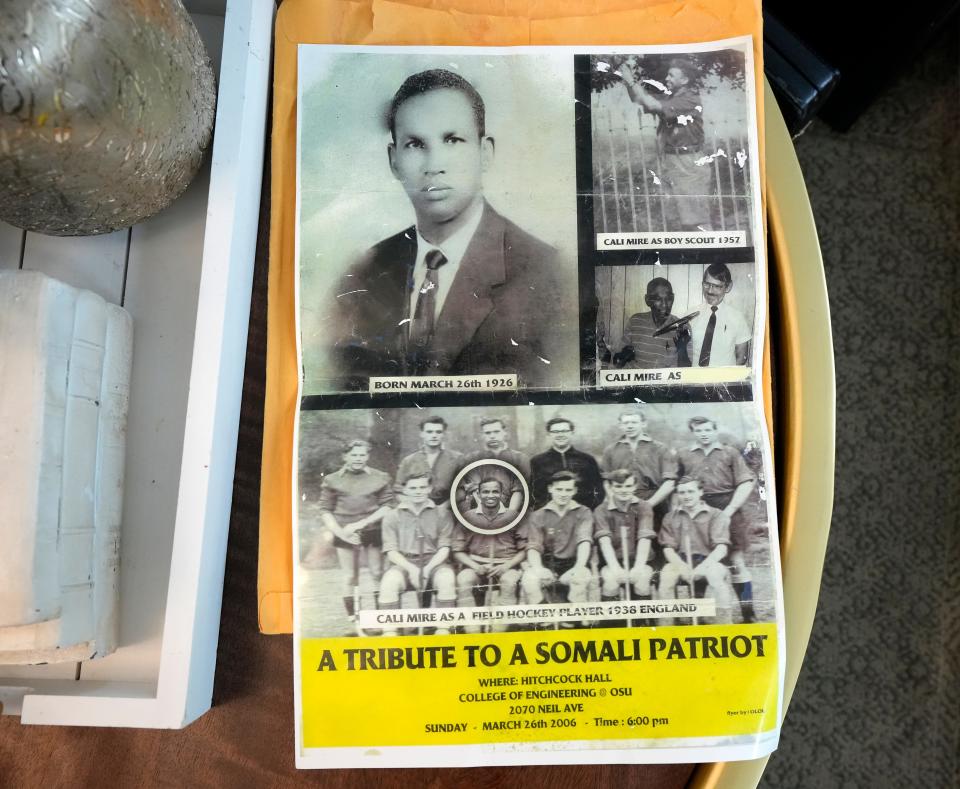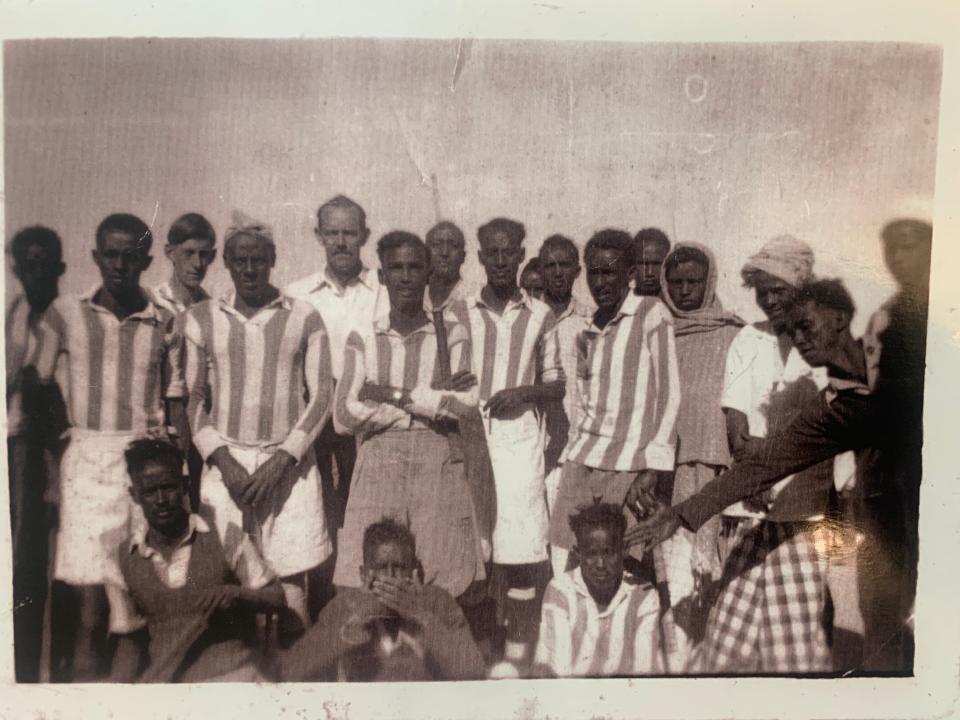From herding camels to national hero: the story of a Buckeye who composed Somalia's anthem
In a pleasant but unassuming home on the outskirts of Columbus lived a man who helped shape the course of history some 7,600 miles away.
The street in a planned suburban subdivision in Jefferson Township, with its manicured lawns and large, cookie-cutter houses, seems a far cry from the arid mountains of northern Somalia where Ali Mire Awaale was born into a camel- and goat-herding family in 1926. Awaale would go on to become a founding figure in Somalia’s formal education system before becoming blacklisted by the country’s military dictatorship in the 1970s.
But he is best known as the composer of the song “Soomaaliyee Toosoo,” which was the rallying cry of Somalia’s independence movement in the 1940s and ’50s, and later became its national anthem.
Awaale spent the last three decades of his life in the United States, working for a parking company in Dayton before retiring in Columbus.
When he died June 24 at age 97, scores of people from Columbus’ Somali community attended his burial in the Islamic Cemetery near Easton Town Center.
“I can't think of many other people who have left a mark on Somali history (more than) him,” said Osman Hassan, 86, a former student of Awaale who spoke to The Dispatch by phone from his home in Switzerland. “By coming up with this short song and beaming it out to the Somali nation throughout the whole Horn of Africa … he was a catalyst for driving the first nationalist movement.”
Awaale, who had 19 children, lived his last years with daughter Ayana Mire, 43, who runs a Columbus-based disability services company with her husband.
“My father was very important to not only us but to the whole community,” she said. “He was one of those people that didn't care who you were, but if you needed help, he was there. If he thought there was a change to be made, wherever he was at, he would do that.”

A boy in Aden
When Awaale was born, the northern part of Somalia where his family lived was under British rule. There was no formal education system except for a handful of Quranic schools, which offered Arabic classes to a tiny minority of children, Hassan said.
At age 7 or 8, Awaale’s parents sent him to work in Aden, in what is today Yemen. At the time, the British-controlled port city was a flourishing hub of commercial activity in the Middle East, before oil wealth shifted the center of gravity to Persian Gulf cities like Dubai and Doha. Aden attracted many Somalis seeking their fortunes, Hassan said.
Awaale lived there with an aunt and worked as an “office boy,” serving tea and sometimes cleaning laundry, said his son, Mohamed Ali Mire, 70, who lives in Sweden.
Awaale picked up Arabic and English, and in the evenings, he would sit under a window where a literacy class was taking place and surreptitiously listen to the lessons.
“He was really curious, very eager to learn from the world. But he was not in a position to have someone who would help him to go to school,” Mohamed said.
One evening, the teacher caught Awaale and asked him to explain himself. Amazed at how much the boy had learned by peeping through the window, he then invited Awaale to join the class, according to an article by Hassan on the Somali news site Wardheer News.

A voice for Somali independence
When Awaale was 18, he returned to Somalia, intending just to visit, but then he was recruited by the newly founded English-language Sheikh School, in part because of his athletic prowess. Awaale had garnered a reputation as a field hockey player in Aden, according to his family.
Hassan, who would go on to a career with the BBC and the United Nations, was a student of Awaale in mathematics and geography. He said Awaale was different from the other teachers, who were mostly British, frequently used corporal punishment and did not really try to get to know students.
“A very charming man, always smiling, very sporty. … He’d come in the evenings and entertain us with Somali stories because the history we (learned in the classroom) was British colonial history — nothing to do with Somalia. He would come and tell us stories about Somali folklore because there was no textbook of Somali history that we could look into,” Hassan said.
Awaale also organized dramas based on Somali folklore, which he toured along the Somali coast, Hassan said.
Around 1947, Awaale penned a poem, which would be turned into a song, titled “Soomaaliyee Toosoo,” or “Somalis, wake up.”
Using pastoral metaphors, it called for Somali unity against a foreign occupier: “Somalis wake up, wake up and assist always the weaker among yourselves/ … You have been herded like a flock of sheep, put into groups of ten and thus ruled by your enemy/ … You are unified by one law, language and one land and hence cannot desert each other.”

Mohamed said his father was not a member of Somali political groups openly advocating for independence at the time, but he lent his support to the movement through his poetry and by imparting lessons to his students.
“He taught us not to be a British product,” Hassan said. “That was his message he sent to the Somalis: Get out and get your independence, prepare yourself, unite!”
He added that “Soomaaliyee Toossoo” “went viral” as people memorized it and shared it with friends, since radios were uncommon at the time.
Although another teacher at the Sheikh School, Yusuf Haji Adam, is sometimes listed as a co-author of the song, Hassan and Awaale's family said Awaale wrote the lyrics alone. Hassan, who had both men as teachers, said Adam didn't claim to write the song while he was alive and Adam's descendants only began claiming he helped write the song after he died.
British Somalia gained independence on June 26, 1960, and united five days later with the Italian Trust Territory of Somaliland, in the south and east, to form the country of Somalia. Though “Soomaaliyee Toossoo” was officially the national anthem only from 2000 to 2012, it has long been considered one of the best-known songs about Somali national identity.
More: Somali-American candidates overcome hurdles in pursuit of Ohio Statehouse seats
An international career
Continuing to work in education, Awaale went to Chelsea College of Arts in London for a teacher training course in 1957, according to his family. He returned to Somalia and got a job with the police, working to enhance police education, before being appointed by the government as a regional education director. Having been exposed to the Boy Scouts in the U.K., Awaale also helped introduce scouting to Somalia, his son Mohamed said.
The military regime of Mohamed Siad Barre, which ruled Somalia from 1969 until 1991, viewed Awaale with suspicion for supporting democracy. In 1975, he was dismissed from his post as “kacaan diid” — or anti-revolutionary, according to the family.
He then taught at the Saudi Aramco Expatriate Schools in Dahraan, Saudi Arabia, until 1989. In 1992, he moved to the U.S. — first to Virginia and then to Ohio, his family said.
In Columbus, Ayana said her father remained devoted to education and service. After retiring in 1998, he taught English as a Second Language and adult literacy classes for senior citizens in Somali coffee shops on the city’s Northeast Side.
“He always used to look at the people that were at the bottom. … If he saw a family that was struggling, he’d go to the grocery and buy them food,” Ayana said.

Today, Somali politics are dominated by divisions among four major clans, as well as various other minorities. There are also ongoing conflicts between the government and the extremist group al-Shabab and separately over the breakaway region of Somaliland, which declared independence from the rest of the country in 1991 but remains unrecognized by any foreign country. Meanwhile, Western companies have expressed interest in oil exploration in the region, and Russia is reported to be eyeing building a naval base in northern Somalia to compete with nearby American and Chinese bases in Djibouti.
Ayana said that Awaale’s anthem about Somali unity is as relevant today as ever.
“The song wasn't just for that time — it’s happening again. Somalia is getting separated again. At that time it was divided because of the British and the Italians — but now it's just (Somalis) doing the division,” Ayana said.
In 2021, Awaale was honored as the special guest at a Somali Independence Day celebration at Columbus City Hall.
In front of city and state leaders, he gave a didactic speech on the beauty of the Somali language. And then, with a twinkle in his eye, he launched into song.
The crowd, in unison, joined in to sing “Soomaaliyee Toosoo.”
More: Columbus celebrates Somali Independence Day with City Council, festival events
Peter Gill covers immigration, new American communities and religion for The Dispatch in partnership with Report for America. You can support work like his with a tax-deductible donation to Report for America at: bit.ly/3fNsGaZ.
pgill@dispatch.com
This article originally appeared on The Columbus Dispatch: Ali Mire Awaale, Somalia's national anthem composer, lived in Columbus

